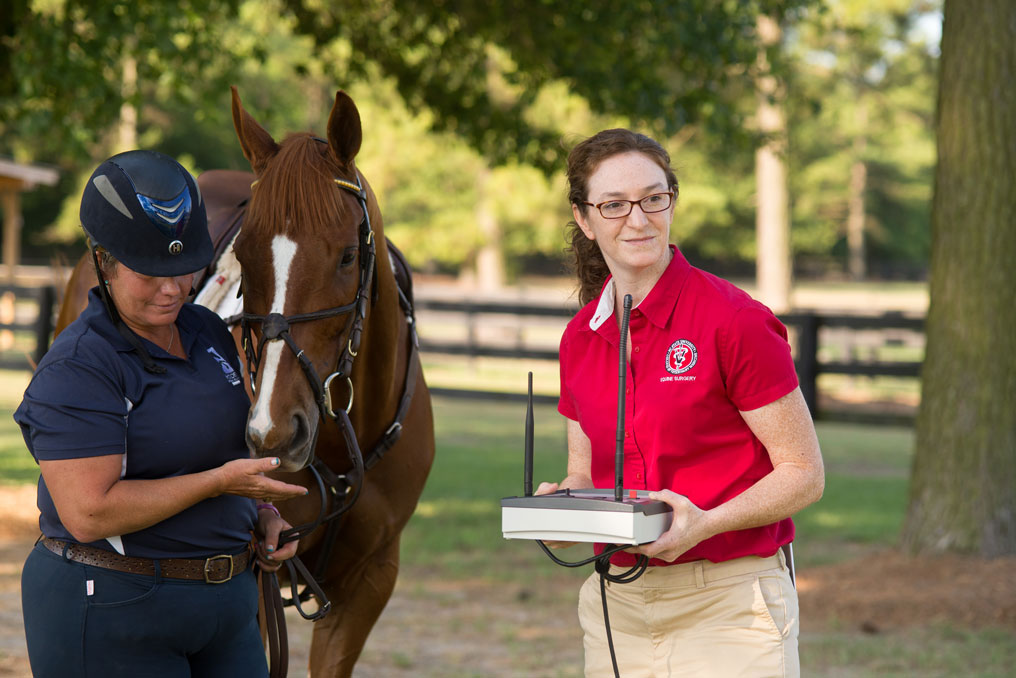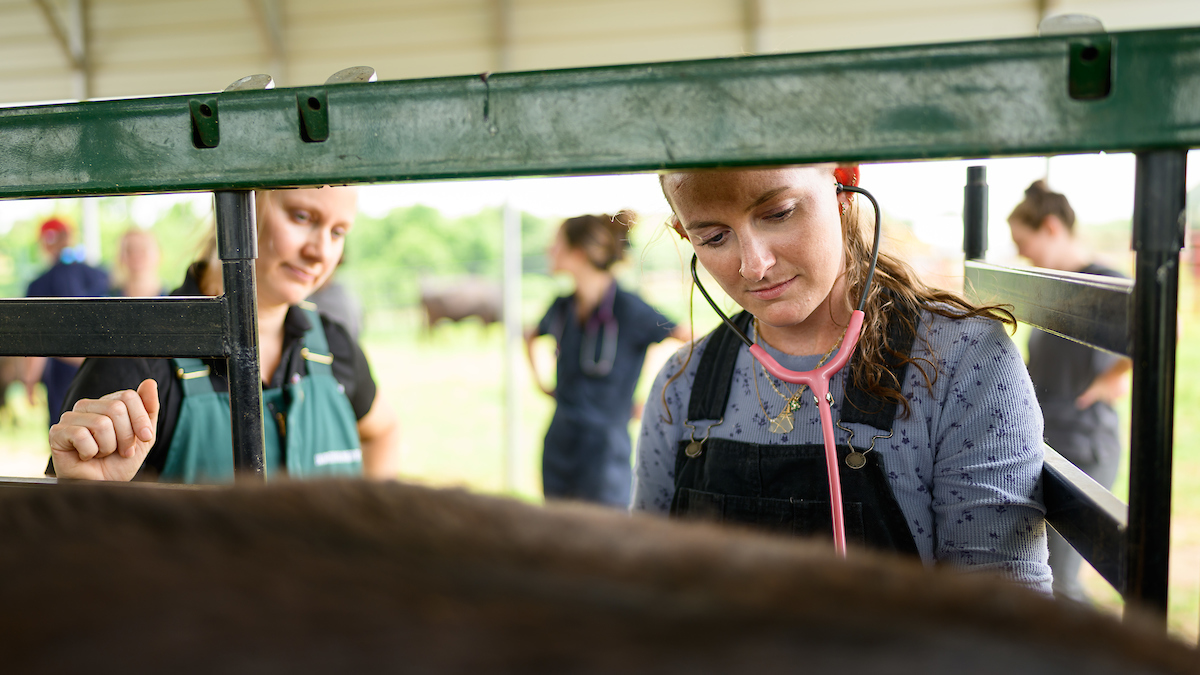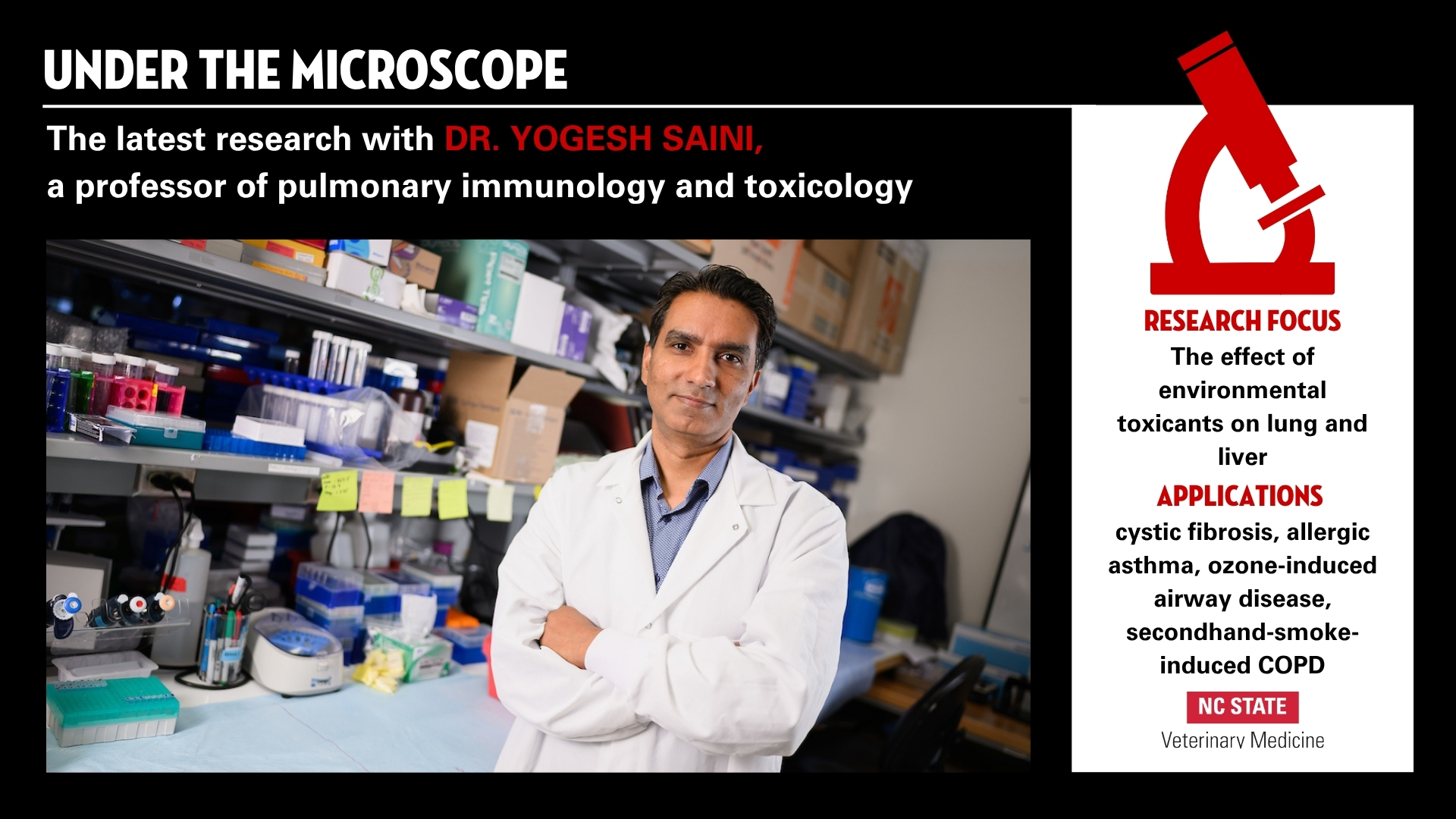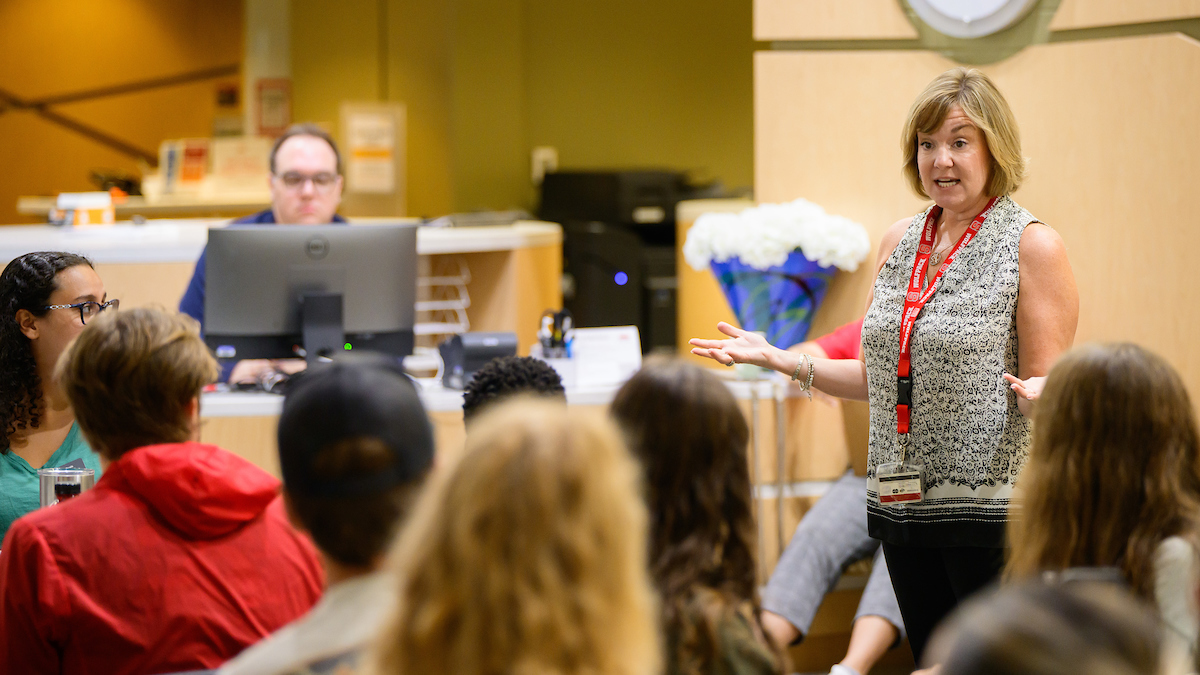Equine Surgeon Committed to Compassionate Care

She grew up on a beef cattle farm, but they were never the only animals in Callie Fogle’s life.
Many were strays she and her sister could not resist nurturing back to health and then releasing. They kept squirrels and baby birds and a one-eyed Siamese cat. They also always had horses.
Fogle, clinical associate professor of equine surgery, is nearing her 15th year at the NC State College of Veterinary Medicine. She splits her time each week between soft tissue surgeries and emergency interventions with teaching, which she is particularly passionate about, and research and clinical studies primarily focused on colic and orthopedic surgery.
 “I think growing up I always thought I would be a veterinarian,” said Fogle. “I started working at the veterinary clinic in town when I was probably about 14. I was welding, mowing grass, and painting fences for them, just to be there and try to absorb as much as I could.”
“I think growing up I always thought I would be a veterinarian,” said Fogle. “I started working at the veterinary clinic in town when I was probably about 14. I was welding, mowing grass, and painting fences for them, just to be there and try to absorb as much as I could.”
She was and raised in tiny Stonewall, La., just south of Shreveport. After undergraduate studies at Centenary College, Fogle earned a DVM from Louisiana State University. She married a fellow veterinarian, Jonathan Fogle, and started work at the CVM in 2003, soon after her husband also joined the faculty. He’s now an assistant professor of microbiology and immunology at the CVM, and the two are parents to Nate, 8, and Willa, 6.
In the middle of a typical busy week, Fogle sat down to talk about her commitment to equine health, the importance of client communication and promising advances in treatment.
How would you describe the college’s focus on equine medicine?
Being in the equine service is very exciting right now. We have multiple young, engaged, energetic faculty members. It’s just wonderful to be able to work with people who are so excited about what we’re doing. You definitely feel like the equine section is a team.
What makes our equine service unique?
Many universities have equine sections. I think what makes us unique is the breadth of our research and clinical interests. We are the whole package. No one person in the equine section has exactly the same interest as anyone else. I think that diversification makes us unique. The atmosphere and the collegiality and the camaraderie that the group has — that’s also a unique thing.
Where do most of the clients you see come from?
The bulk of them are from North Carolina, but we definitely also see clients from Virginia and South Carolina and other surrounding states. That’s not uncommon.
What kind of cases from North Carolina are you seeing?
The horse industries that are really strong in North Carolina are particularly the sport horse discipline, dressage and hunter-jumper. Western pleasure is a historically strong discipline for North Carolina, but recently we’re seeing a lot more cutting horses and reining horses. Then we see some from the rodeo disciplines — barrel racing, roping — which are also usually quarter horses. And a lot of the state’s horses also used for trail riding because North Carolina is one of the best states for that.
Your clinical work is primarily soft tissue surgery. What are the types of cases that require that surgery?
There are lots of upper respiratory problems, so sinus and teeth problems, and also problems with the throat. There are also the horses that are having trouble with exercise — they’re not getting enough air — so some sort of complaint of performance issues related to the upper airway.
We see a good bit of skin tumors. There’s also colic surgery, an emergency surgery that can happen in the daytime and at night. The last elective category would be urogenital, so horses with a tumor on their ovary, for example, would be a common case.
Is there a case that’s been the most memorable or impactful for you?
There was a horse that had colic that I operated on twice. Even though the outcome was not good when she coliced the third time, the relationship with the owner was very meaningful. She was really passionate about her horse and really engaged with me. She was intense about helping her horse, and I think that pushed my level of practice.
What’s your philosophy about maintaining a good relationship with a client?
I recognize the importance of communication. I think it’s part of my nature. I want to please people and I want people to have a good experience when they come here. I feel like the quickest way to displease someone is to have miscommunication or not communicate effectively.
I’m pretty passionate about making sure that everyone is doing exactly what the owner wants. I want to do the right thing for the horse, and at the end of the day it’s not my money I’m spending — it’s theirs. I want to make sure I’m being diligent in spending the money they gave in the best way possible.
Where do you think your communication skills come from?
You know, my dad was a mechanic. I watched him communicate with his customers about their cars, giving them the “it’s time to let this one go” talk. It seems silly to compare that to living animals, but I think that’s something people appreciated, instead of him just saying, “OK, that will be $1,500. Thanks very much.” He would take the time to make the call and say,
“Hey, it’s time to let this one go. It’s not time to put $1,500 in my pocket.”
Was there a moment when you decided to go all-in with a veterinary career?
I had a really impactful comparative zoology class and professor in undergrad. It was probably one of the hardest courses I’ve ever taken, from one of the best teachers, even among my veterinary school courses.
What about it stuck with you?
This is crazy, but it was actually a test. The tests were really amazing. The professor would have a made-up animal on this test and she would tell you, “OK, so this animal needs to survive in salt water. Make up an adaptation that will allow this animal to live in salt water.”
So then you had to really had to be the evolutionist and create this adaptation. It just got the creative juices flowing and made me realize that I definitely needed to be around animals to feel fulfilled in my career.
So why horses?
I think it wasn’t until I was in the fourth year of veterinary school that I knew I wanted to do that exclusively. I really thought I was going to go back and work for the veterinary clinic I had worked for since I was 14 and live in small town Louisiana. I guess I probably could have done that and been happy, but life happened. I had a really good mentor, Rustin Moore [now dean of Ohio State University’s College of Veterinary Medicine], when I was in veterinary school at LSU. He encouraged me to consider equine veterinary medicine as a career when I was on my equine surgery rotation with him.
Why do you think he did that? What do you think he saw in you?
I really don’t know [laughs]. When I look at the students here these days, they are so mature and they really have everything together. I didn’t have any of that, so I’m not sure what he saw. He must have seen a diamond in the rough or something. His mentorship means a lot to me.
What did you learn from him?
How to be a good mentor myself. He’s supported me through letters of recommendation and talks through various stages of my career. That’s one of things that I have taken from that relationship and hopefully incorporated in being a good mentor to the students and house officers here.
What do your children think about both of their parents being veterinarians?
It’s funny. I think it’s just normal for them. I don’t know if they think it’s something unique or special. Willa did ask me once, “Mom, what do you like more: keeping animals healthy or spending time with your family?” I don’t even know where this came from. I was like, well, I like both. She said, “Well, if you had to choose.” And I said I would choose spending time with my family, and she said, “I knew that’s what you’d say!”
Sometimes when I’m busy, I don’t feel like I am doing my best at being a mom or at being a veterinarian, but even then I wouldn’t trade it for anything. Jonathan is my partner in the truest sense of the word and the main reason I can be an equine veterinarian and have a family. I know it sounds corny, but he is Super Dad.
What aspect of future equine medicine research or treatments are you the most excited about?
It’s clinical innovations that I find really exciting, especially some of the work that we’re doing here with gastrointestinal disease in horses. Looking at ways to impact the survival and address complications after horses have colic surgery can have an immediate, direct impact in the horses that we’re treating.
The other areas of soft tissue surgery that I think are pretty exciting are the advances in imaging of horses, particularly horse heads. The majority of surgeries I do in a week are with standing horses. Being able to acquire a 3-D image of the head of a standing horse is something that’s coming really soon.
Finally, what do you think makes a good vet a great vet?
For me, it’s communication. There are a lot of people who have an amazing knowledge base and a really good foundation in clinical reasoning and critical thinking skills, which are important in being a great veterinarian. But if you don’t have a way to communicate those things effectively to a client, to take what you know and translate it into something tangible for them, it’s very hard to be successful.
For more on the NC State College of Veterinary Medicine’s equine service, go here.
To support the fund for the CVM’s new Equine and Farm Animal Veterinary Center, go here.
~Jordan Bartel/NC State Veterinary Medicine
- Categories:


